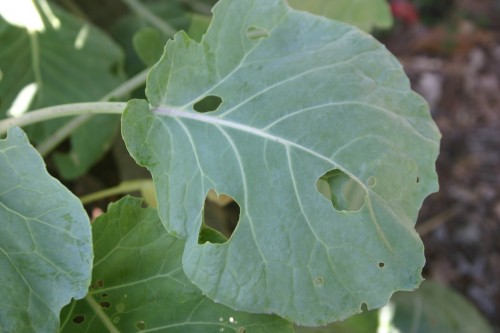





Q: I called your radio show about the holes in my collard plants. You suggested I use B.t. for the caterpillars. The local nursery didn’t have B.t., but sold me a garden insecticide containing spinosad. When I read the label, it said “In the state of Georgia, do not apply this product to Collards, Kale, Mustard Greens, Spinach, etc…” Can you shed some light on this?
A: It turns out that the situation goes back several years to when diamondback moth caterpillars were wreaking havoc on collard fields all over Georgia. Dr. Stormy Sparks says that growers had been using a product that contains spinosad (SpinTor) to control diamondback moth for several years previous but noticed that they were getting less and less control as the years wore on. Spinosad was discovered in the soil of a rum distillery and is used in organic production.
Growers loved SpinTor because it has very low toxicity to mammals and is very effective against many hard-to-control insects. When growers and researchers noticed spinosad wasn’t working as well as before, they suspected that insecticide resistance was developing. Indeed, that was proven to be the case.
To combat resistance, growers were limited to just a few applications per year. Homeowner use of spinosad on selected leafy greens (collards, kale, mustard, etc) was limited as well.
That explains why you saw the “GA exemption” on the label.
Going back to your original problem, continue to look for a caterpillar killing product that contains Bacillus thuringiensis (B.t.). This organic pesticide will control caterpillars that eat holes on leafy crop foliage.

caterpillar damage
Copyright © www.100flowers.win Botanic Garden All Rights Reserved